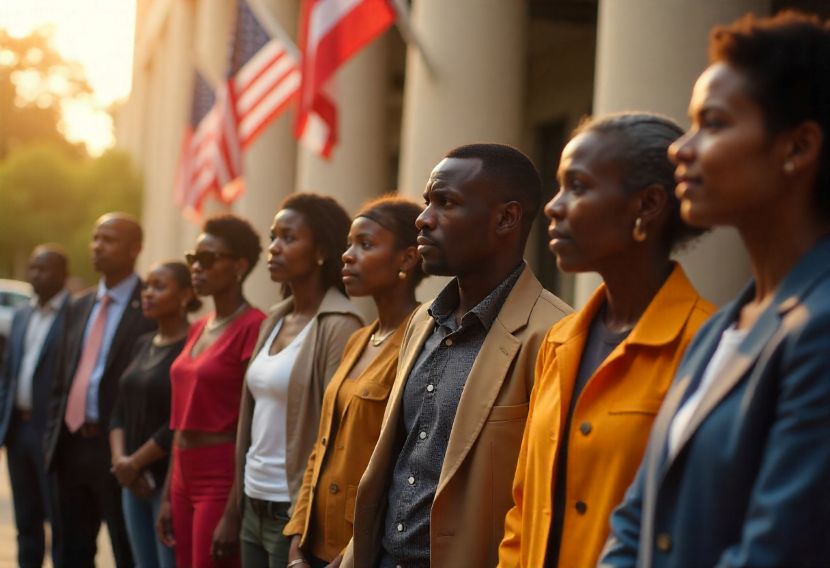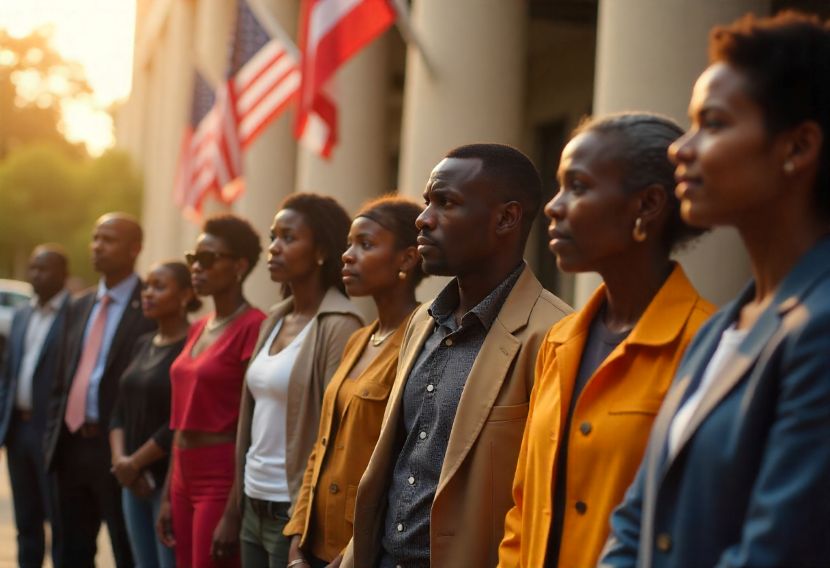Tuesday, July 22nd, 2025

Kenyan citizens will soon face a significant increase in US visa application costs, along with travelers from various countries, including Nigeria, South Africa, India, Brazil and more. The introduction of the new Visa Integrity Fee, scheduled to take effect from October 2025, requires an additional $250 (approximately 32,250) to be paid in addition to the existing visa fees. The change is part of a broader “one big beautiful bill law” passed by the US government and is expected to affect non-immigrant visa applicants around the world.
Understanding new US visa integrity fees
All non-immigrant visa categories are subject to visa integrity fees under the new law. This applies to work-related visas such as F1 student visas, J1 visitor visas, H-1B, L-1S, O-1, and other dependents (H-4, F-2, J-2). For those using DHL's courier service, it's even more expensive, going around $150, according to Tande Omehin, a Nigerian visa expert who offers analysis of visa hiking from Kenya, South Africa, India, Brazil, Nigeria and other countries.
For example, the regular price for a B1/B2 visa is currently SH23,865 ($185), F1 or J1 visas is about Sh23,865 ($185). Additionally, the cost of petition-based worker visas, namely H and L, is SH26,445 ($205). Now, with the new visa integrity fees, these costs are set to spikes. For students applying for a US visa, the total costs currently cost over SH56,000, and for workers' visa applicants, the costs could exceed SH58,695.
Countries affected by visa integrity fees
New visa integrity fees will affect all countries that are not part of the US Visa Waiver Program (VWP). This includes a considerable number of countries in Africa, Asia, Latin America and the Middle East. Countries such as Kenya, Nigeria, South Africa, India, Brazil and Mexico will become one of the countries needed to pay this additional fee.
Africa: Kenya, Nigeria, South Africa and other African countries are excluded from the US visa waiver program, so travelers from these countries will have to pay an additional $250 fee. The new rates are expected to increase the financial burden for students, workers and tourists seeking trips to the US in Kenya. As Africa is an important region for the United States in terms of economic, diplomacy and education, this rate could affect the flow of travelers from African countries. In particular, India has seen a surge in visa applications over the years due to its strong economic growth and educational exchanges with the US. New fees could lead to a reduction in visa applications as applicants weigh the additional costs. Similarly, Chinese citizens who frequently travel to the United States for business and academic purposes will be affected by this new rate. Mexico is a US neighbour, with many travelers to the US every year, especially for business and tourism. Additional costs are likely to discourage some Mexican citizens from applying for US visas, and could affect tourism and business exchanges between the two countries. The United States has long been an important partner for these countries in terms of trade, defense and education. However, with the introduction of this new rate, travelers from these countries will have to pay additional costs. This can discourage academic and business interactions, especially for those seeking to study or work in the US.
How to bill visa integrity fees
New visa integrity fees will be charged per person. This means that the costs will be significantly increased for families applying for a US visa together. Fees are paid only after the visa application is approved by the US Consulate. This contrasts with traditional machine-readable visa (MRV) fees. This is paid in advance prior to the visa interview and is non-refundable.
Visa integrity fees are collected as part of the final step in the visa application process. Applicants whose visa application is denied will not have to pay the fee. This provides some relief to those whose applications fail because they do not carry an additional financial burden.
Potential impact on visa applicants in affected countries
New claims could affect travelers from countries such as Kenya, Nigeria, South Africa and India. US visa fees can be overly expensive for most people, including students and skilled professionals.
Higher Travel Costs: Paying an additional $250 in fees will increase the cost of obtaining a US visa. For Kenyan students seeking to attend US universities, the additional costs can even prevent some people from applying. Similarly, workers looking for employment in the US may have difficulty paying higher visa fees. Additional weights can make obtaining a visa even more difficult, especially for low-income applicants. Financial impact on families: Because application to VIFs is a separate level of transaction, family costs are broadly and high. This may discourage families from trying to travel to the United States for tourism and family unity. Especially because many people are already struggling to achieve their goals. Lower visa application potential: Increased US visa fees for citizens of the target country could lead to fewer applications. Additionally, as visa fees increase, we may decide or consider other destinations. This is in Europe, Canada, and Canada with low visa fees.
Visa Integrity Fee Waiver
It is important to note that travelers from countries included in the US Visa Waiver Program (VWP) are not eligible for the new visa integrity fee. Citizens of countries such as the UK, Japan, Germany and Australia are exempt from this additional fee. The visa waiver program allows citizens of these countries to visit the US for tourist and business purposes for up to 90 days without the need for a visa. As a result, the impact of the new rates will affect travelers from countries that are not primarily part of the program.
What next for the affected visa applicants?
With new rates coming into effect in October 2025, travelers in affected countries must prepare for additional costs. The US Consulate is likely to release further information about the process of paying visa integrity fees, and applicants should consider this additional fee when budgeting visa applications.
Applicants must also be notified of potential future increases in visa integrity fees. From 2026 onwards, rates will be adjusted annually to match inflation. This means it could increase even more over time.
Conclusion: Global change with local influences
The introduction of US visa integrity fees represents a major shift in the visa application process for travelers from countries such as Kenya, Nigeria, South Africa, India and Brazil. The fee applies to all non-immigrant visa categories, which adds a financial burden to anyone looking to travel to the US for business, learning or tourism.
The fees aim to increase the security and integrity of the US visa system, but can have unintended consequences for global travel, particularly for students, workers and tourists in non-VWP countries. New fees could lead to reduced visa applications and discourage them from pursuing opportunities in the US
As US visa policies evolve, travelers from affected countries should carefully plan these additional costs and look for up-to-date information on implementing visa integrity fees.
Tags: B1/B2 visa fees, H1-B visa fees, Johannesburg, Kenya student visa increase, Lagos, Los Angeles, Mexico City, Nairobi, Sao Paulo, South Africa, South Africa, US visa application fees, US visa integrity fees, Buka fees, Kenya, Washington



